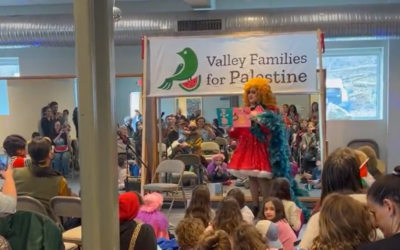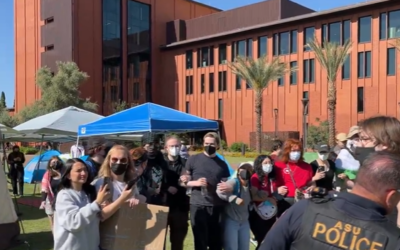By Corinne Murdock |
The Supreme Court (SCOTUS) has agreed to take up a case that would have an impact on Gov. Katie Hobbs’ past censorship activities.
The case, Murthy v. Missouri, focuses on the alleged coordinated campaign by government officials and social media companies to suppress and censor certain speech on major public issues, specifically the COVID-19 lab leak theory, pandemic lockdowns, vaccine side effects, election fraud, and the Hunter Biden laptop story. Hobbs, while secretary of state and during her gubernatorial campaign, coordinated with social media companies to remove certain speech online.
Hobbs’ then-chief of staff and former assistant secretary of state, Allie Bones, said in a statement prior to Hobbs’ inauguration that it was the job of governments to purge the public square of perceived misinformation and disinformation.
“One of the ways we [make sure that voters are informed] is by working to counter disinformation online that can confuse voters,” stated Bones. “This is yet another example of conspiracy theorists trying to create chaos and confusion by casting doubt on our election system. It’s unfair to Arizona voters and it’s harmful to our democracy.”
Although SCOTUS accepted consideration of Murthy v. Missouri, they didn’t accept a lower court’s injunction preventing government officials from continuing their coordination with social media companies to moderate online speech. Justices John Roberts, Sonia Sotomayor, Elena Kagan, Brett Kavanaugh, Amy Coney Barrett, and Ketanji Brown Jackson together granted the Biden administration’s petition to remove the injunction, effectively permitting the government to engage in censorship online.
In a dissenting opinion, Justice Samuel Alito wrote that the SCOTUS majority’s suspension of the injunction was “disturbing,” and that any censorship of private speech is antithetical to democracy. Alito dismissed the Biden administration’s argument that an injunction against coordinating with social media companies to control citizens’ speech was the same as preventing government officials from speaking on a matter.
“The injunction applies only when the Government crosses the line and begins to coerce or control others’ exercise of their free-speech rights,” said Alito. “Does the Government think that the First Amendment allows Executive Branch officials to engage in such conduct? Does it have plans for this to occur between now and the time when the case is decided?”
Alito further declared that SCOTUS had effectively ruled to allow the Biden administration to continue with its First Amendment violations identified by the lower courts.
“At this time in the history of our country, what the Court has done, I fear, will be seen by some as giving the Government a green light to use heavy-handed tactics to skew the presentation of views on the medium that increasingly dominates the dissemination of news,” said Alito. “That is most unfortunate.”
Justices Clarence Thomas and Neil Gorsuch joined Alito in his dissent.
Gov. Hobbs issued an emergency heat declaration with an expired enforcement date the day after additional emails revealing her coordinated censorship efforts were released. Hobbs dismissed the emails as a “sideshow,” but didn’t deny allegations of maintaining unscrupulous relationships with major social media companies.
Hobbs’ past coordination with social media companies prompted the House to establish an interim ad hoc committee on Oversight, Accountability, and Big Tech. The committee first convened in September and met once more earlier this month.
While SCOTUS contemplates the case, Hobbs already has defense provided by the state’s chief legal officer.
In August, Attorney General Kris Mayes joined a 21-state coalition of Democratic attorneys general opposing the then-active federal injunction. Mayes declared that control over free speech is paramount to public safety, implying that governmental interest in safety outweighs the constitutional right of free speech.
“Social media companies and government officials must have open communication in order to ensure the safety of Americans online,” said Mayes. “A pillar of the U.S. government is to ensure the safety and wellbeing of its citizens. The lower court’s decision impedes on this protection and means federal, state and local officials cannot contact social media companies about dangerous online content.”
Corinne Murdock is a reporter for AZ Free News. Follow her latest on Twitter, or email tips to corinne@azfreenews.com.








